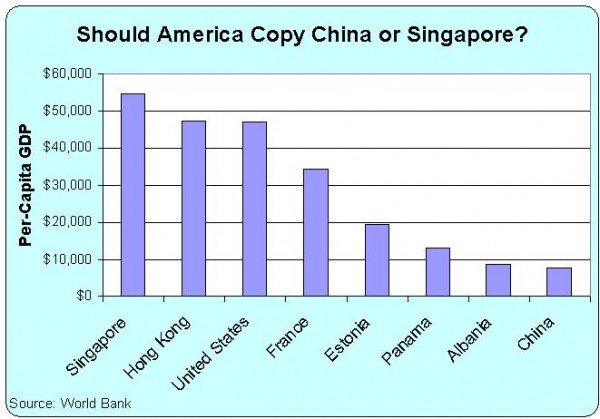I’m glad that China has taken some steps away from communism. According to Economic Freedom of the World, China was one of 10-worst nations for economic liberty back in 1980 and they’ve since climbed to 92nd place out of 141 nations.
I’ve even offered a small bit of praise for China’s shift to a more business-friendly environment, and I was greatly amused when the head of China’s sovereign wealth fund mocked the Europeans for destructive welfare state policies.
That being said, 92nd place is still a very anemic rank, far below the first- and second-place jurisdictions, Hong Kong and Singapore.
So I was flabbergasted when Andy Stern, a former union boss and long-time Obama ally, wrote a column for today’s Wall Street Journal praising the efficiency and vitality of China’s planned economy.
You probably think I’m pulling your leg and/or deliberately misrepresenting what he wrote, but his article was titled “China’s Superior Economic Model.”
And just in case you think that’s the fault of editors and he couldn’t possible say such a thing, let’s look through the piece.
He starts off praising the goals of China’s latest five-year plan.
The aims: a 7% annual economic growth rate; a $640 billion investment in renewable energy; construction of six million homes; and expanding next-generation IT, clean-energy vehicles, biotechnology, high-end manufacturing and environmental protection—all while promoting social equity and rural development. Some Americans are drawing lessons from this. Last month, the China Daily quoted Orville Schell, who directs the Center on U.S.-China Relations at the Asia Society, as saying: “I think we have come to realize the ability to plan is exactly what is missing in America.”
Gee, that sounds so uplifting and inspirational. But there’s one tiny problem. China is still a very poor country. Here’s a chart showing the 2010 data from the World Bank.
Maybe I’m a crazy free-market ideologue, but I’d rather copy the Singapore or Hong Kong economic model.
But if I can’t choose one of those Asian tigers, I’ll stick with the U.S. system. Americans, after all, are about six times better off than the Chinese. Heck, China is still behind Albania.
Mr. Stern then writes about the supposed failures of “free-market extremism” in the United States.
The conservative-preferred, free-market fundamentalist, shareholder-only model—so successful in the 20th century—is being thrown onto the trash heap of history in the 21st century. In an era when countries need to become economic teams, Team USA’s results—a jobless decade, 30 years of flat median wages, a trade deficit, a shrinking middle class and phenomenal gains in wealth but only for the top 1%—are pathetic. …This should motivate leaders to rethink, rather than double down on an empirically failing free-market extremism. As painful and humbling as it may be, America needs to do what a once-dominant business or sports team would do when the tide turns: study the ingredients of its competitors’ success.
Since this is a pro-family blog, I won’t repeat the inappropriate words that came out of my mouth upon reading these passages.
Instead, I’ll simply call your attention to this post, which shows how America’s score in the Economic Freedom of the World ranking declined during the past decade. Indeed, the United States was among the five nations with the biggest declines over that 10-year period and the United States dropped from 3rd to 10th during those years.
If that was a period of “free-market fundamentalist” policies, then I guess I need to start cheering for socialism.
I’ll conclude by doing one of my favorite things – quoting myself. Here’s a bit of what I wrote last year.
China has been growing in recent decades, but it’s almost impossible not to grow when you start at the bottom – which is where China was in the late 1970s thanks to decades of communist oppression and mismanagement. And the growth they have experienced certainly has not been enough to overtake other nations based on measures that compare living standards. …This is not to sneer at the positive changes in China. Hundreds of millions of people have experienced big increases in living standards. …But China still has a long way to go if the goal is a vibrant and rich free-market economy.
I’ve probably exhausted everyone’s interest in this topic, but if anyone’s a glutton for punishment, I was part of a debate on English-language Russian TV about Chinese and American economic policy.

